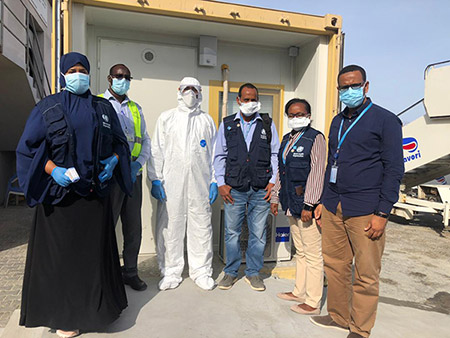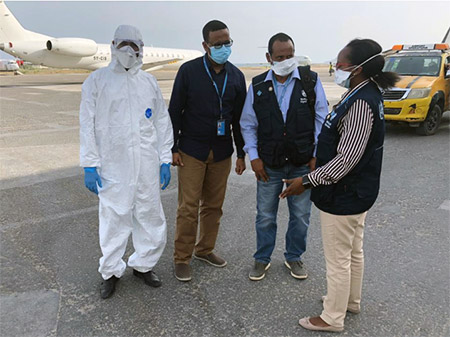 In the absence of testing facilities for COVID-19, the WHO staff are involved in safe packaging and transportation of samples collected across the country to the testing laboratory at KEMRI. So far, over 50 samples from the suspected cases have been collected and tested at the refence laboratory for COVID-19 The WHO country office is supporting the Ministry of Health and Human Services of the Federal Government of Somalia, as well as all state health authorities to scale up operational readiness for early detection and response to large scale community transmission from coronavirus disease (COVID-19).
In the absence of testing facilities for COVID-19, the WHO staff are involved in safe packaging and transportation of samples collected across the country to the testing laboratory at KEMRI. So far, over 50 samples from the suspected cases have been collected and tested at the refence laboratory for COVID-19 The WHO country office is supporting the Ministry of Health and Human Services of the Federal Government of Somalia, as well as all state health authorities to scale up operational readiness for early detection and response to large scale community transmission from coronavirus disease (COVID-19).
As of 6 April, the government has officially reported 7 laboratory-confirmed cases of COVID-19, 2 of these cases were reported from Somaliland. While 6 of these reported cases have travel history before they became sick or were quarantined, the investigation on the remaining case suggests that the case might have been locally acquired as the case has no travel history. This clearly shows that the country is now entering into a different transmission phase where further human-to-human transmission from COVID-19 can be expected. Given the fragility of the health systems, security situation in the country, weak surveillance system and insufficient number of skilled health workforce in the country, there are heightened risk that cases may go undetected or undiagnosed if community transmission begins as a result of wide spread of the virus.
Since the beginning of COVID-19 outbreak in January 2020, WHO has geared up its preparedness and operational readiness measures in the country helping the government to pre-position personal protective equipment for the first responders and health care workers to treat an initial 500 cases, train over 800 health care workers on early recognition, detection and investigation of cases, expand its early warning disease surveillance system to pick up the suspected cases rapidly, support the establishment of screening facilities at 21 designated points of entry across the country to cover over 75 000 returnee travellers and above all facilitating testing of the COVID-19 cases using the BSL-2 laboratory facilities at the Kenya Medical Research Institute (KEMRI) in Nairobi.
 As the cases gradually build up and the country moves to a different epidemiological transmission patterns where human-to-human transmission is more likely, the priority for now is to avert large-scale community transmission through scaling up testing of all suspected COVID-19 cases, irrespective of travel history, aggressive contact tracing and efficient management of all close contacts using appropriate measures such as isolation and quarantine of all suspected cases and close contacts and scaling up risk communication activities to target the high-risk population.
As the cases gradually build up and the country moves to a different epidemiological transmission patterns where human-to-human transmission is more likely, the priority for now is to avert large-scale community transmission through scaling up testing of all suspected COVID-19 cases, irrespective of travel history, aggressive contact tracing and efficient management of all close contacts using appropriate measures such as isolation and quarantine of all suspected cases and close contacts and scaling up risk communication activities to target the high-risk population.
In the coming days, WHO’s support will also include setting up 3 testing facilities in the country, additional isolation facilities to cover over 1000 suspected cases and mobilizing over 1200 trained health workforce for contact tracing and contact management. WHO’s work continues in Somalia to keep the country safe and protect the vulnerable despite the weakened health systems ravaged by years of war and neglect.



